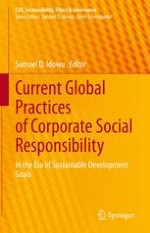2021 | OriginalPaper | Chapter
Corporate Social Responsibility in Mauritius
An Update of the Current Trends and Practices of Corporate Social Responsibility in the Island Economy of Mauritius
Authors : Sanjiv Gungadeen, Zuberia Hossanoo, Vikramsing Gungah
Published in: Current Global Practices of Corporate Social Responsibility
Publisher: Springer International Publishing
Activate our intelligent search to find suitable subject content or patents.
Select sections of text to find matching patents with Artificial Intelligence. powered by
Select sections of text to find additional relevant content using AI-assisted search. powered by
